
I've been asked many times, "How much RAM do I need for gaming?" The short answer is 8GB. Yes, it sounds so simple but bear in mind that there are many factors that affect how your RAM performs together with your other PC components. For this one, we'll stick with an imaginary system with no dedicated video card. This ensures we get close to minimal outside factors when determining the best amount of RAM for a gaming system. That is, considering price to performance, of course.
Why is RAM important?
Random Access Memory (RAM) temporarily holds information that a computer may require to get in real-time or after a couple of seconds, or milliseconds at that. Also known as volatile memory, it holds important data that your PC needs repeatedly or quickly. Hard drives can also store these bits of information but they can't go toe to toe with the read-write speed that RAM sticks offer. The only catch is it's volatile. Once power is cut, all information that the RAM sticks held will be wiped. So how what role does RAM hold in everyday computing? Simply put, the higher the capacity and frequency, the easier it gets for your computer to multi-task. If you've ever asked yourself, "how much RAM do I need for gaming," since you noticed your PC's lagging even when using Google Chrome, we highly suggest you check if you have 8GB of RAM and above.
Today's RAM Standard
4GB is ok, 8GB is good enough, 16GB is A-OK, and 32GB and upwards is overkill. In terms of basic productivity, 4GB is fine enough as long as you don't splurge on too many browser tabs or office apps. For gaming, at least for games that aren't visually intensive, 8GB does the job. However, there'd be some games where you need to finetune some of the graphics settings to get that coveted 60fps. The sweet spot is 16GB. 64-bit versions of Windows require at least 2.5GB of RAM with the remainder of your total RAM waiting to be consumed by other programs. For systems that don't have a dedicated GPU like AMD's A series and Ryzen processors, a portion of your gaming PC's RAM gets allocated to the APU. Radeon Vega is quite a powerful integrated graphics card if given ample RAM room to breathe.
Price to Performance
Building a gaming PC today has never been easier. There are a lot of options in the market and almost every month, if not every week, newer, better, and cheaper components become available. It's nice to think of having 32GB of the fastest RAM available. It's a good investment for future-proofing though DDR5 RAM will soon enter the scene. For external-GPU-less gaming for older generations of games, 16GB provides that comfort zone without hurting your budget. Pair your RAM with a decent enough dedicated video card and you're good to go for the next couple of years or so.









